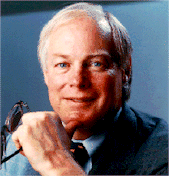
Leach (R-IA)
House Banking Committee Approves Internet Gambling Funding
Bill
(June 29, 2000) The House Banking Committee approved the Internet Gambling Funding Prohibition Act, with an amendment which weakened its effect, by a voice vote on Wednesday, June 28.
| See, Tech Law Journal Summary of Internet Gambling Bills in the 106th Congress. |
The original bill, HR 4419 IH, the Internet Gambling Funding Prohibition Act, sponsored by Rep. Jim Leach (R-IA), Rep. John LaFalce (D-NY), and others, would have prohibited the use of checks, credit cards, and electronic funds transfers for Internet gambling.
However, the House Banking Committee adopted an amendment offered by Rep. John Sweeney (R-NY) which substantially limits the applicability of the bill. The Sweeney amendment, which passed overwhelmingly on a voice vote, and a show of hands, provides that the prohibition contained in the bill applies only "where such bet or wager is unlawful under any applicable Federal or State law in the State in which the bet or wager is initiated, received, or otherwise made".
The House Judiciary Committee has already approved HR 3125, the Internet Gambling Prohibition Act, sponsored by Rep. Bob Goodlatte (R-VA). It contains a general ban on Internet gambling, but contains numerous exemptions for gambling operations currently legal under state law.
The Banking Committee bill, HR 4419, is a far more specific. It deals only with the role of financial institutions and financial instruments involved in Internet gambling.
With the Sweeney amendment, the two bills are more similar. Rep. Leach commented at the markup that he expected the two bills to be merged before final passage by the House.
Rep. LaFalce led the debate in support maintaining the ban contained in the original bill.
Rep. Sweeney was just one of many members who debated in favor of his amendment.
 |
|
| Rep. James Leach (R-IA) |
Rep. Leach, the Chairman of the Committee, offered a "compromise" amendment that would have exempted any "lawful bet or wager that is placed, received, or otherwise made on a live horse or a live dog race ..." It was resoundingly defeated.
The markup session was lengthy and interrupted by several votes on the House floor. The Banking Committee has not dealt with this issue until just recently. Hence, many members were unfamiliar with the operations of the gambling industry, and how the bill and various amendments would apply.
Rep. Mel Watt (D-NC) suggested that "I don't think anyone understands what we are doing at this point."
Rep. LaFalce was open in his opposition to gambling. He cited its harmful effects, including bankruptcy, divorce, alcoholism, and suicide. He stated that the underlying bill "effectively cuts off the payment system" for Internet gambling. He opposed both the Leach and Sweeney amendments.
He also argued that while land based gambling can provide economic benefits to the areas where the gambling operations are located, "the economic benefits of Internet gambling will solely go to web site operators," many of whom are located outside of the U.S.
Proponents of the Sweeney amendment argued that this was a matter that should be left to the various states to regulate. Some members, such as Rep. Watt and Rep. Barney Frank (D-MA), couched their arguments in terms of states rights. Others argued that gambling has traditionally been a matter of state regulation.
Others, such as Rep. Ron Paul (R-TX), argued that gambling was a matter of personal choice, and should not be regulated by the government.
Rep. LaFalce and Rep. Leach responded to the states rights argument by arguing that the Internet has made gambling an interstate activity. "It would be impossible to know that the bets were placed from a jurisdiction permitting the placing of the bets," said Rep. LaFalce. He continued that this meant that any one state could, in effect, set a standard for the nation.
Rep. Marge Roukema (R-NJ) sided with Rep. LaFalce. She argued that the Sweeney amendment would "undermine the whole intention of the bill."
| The Committee held a hearing on HR 4419 IH on June 20, 2000. See, statements of Rep. Jim Leach (R-IA), Gregory Baer (Treasury Dept.), Kevin Di Gregory (Justice Dept.), Alan Kesner (NAAG), Richard Leone (former Commissioner on the National Gambling Impact Study Commission), Daniel Nestel (NCAA), Alec Ingle (NY Racing Assoc.). See also, Tech Law Journal summary of Internet gambling bills. |
Rep. LaFalce had planned to offer an amendment restricting the placement and use of ATM machines, cash advance terminals, and similar electronic devices, in and around gambling facilities. However, he did not ultimately offer the amendment.
Rep. Brad Sherman (D-CA) discussed offering an amendment as an alternative to the Leach and Sweeney amendments. It would have exempted from the prohibition of the bill Internet gambling where the gambler places the bet while in a lawful gambling facility. He argued for a continuation of the current rule that "You can't loose your house without leaving your house." However, he did not offer the amendment.
After a long recess to vote on the House floor on other measures, and to discuss HR 4419, the Committee resumed, and quickly completed its business. In quick succession the Committee conducted three voice votes. First, the Leach amendment was rejected. Second, the Sweeney amendment was approved. Third, the bill, as amended, was approved.
No roll call votes were taken. However, Rep. Leach requested a showing of hands on his amendment. Most of the members present for the vote were Republicans. Almost all voted against the Leach amendment.